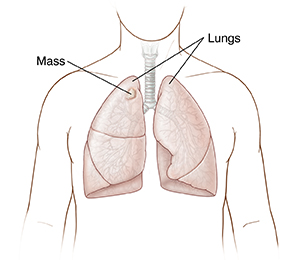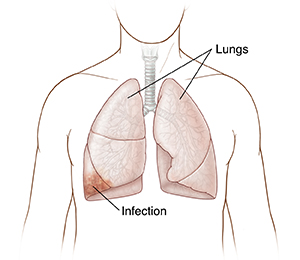Chest and Lung Problems
Many problems can affect the lungs and chest. These include masses, infections, airway diseases, and other diseases. Common types of chest and lung problems are listed below.
Masses
A mass is a lump of abnormal tissue. It can be tissue that's not cancer (benign). Or it can be cancer (malignant). If a mass is found in the lung or chest, the health care provider will want to take a tissue sample (biopsy) of it. This tissue sample helps the provider find if the mass is cancer. The mass may need to be removed even if it's not cancer.

Infections
Infections are illnesses caused by bacteria, viruses, or fungi. Examples of lung infections include tuberculosis and pneumonia. Lung infections can cause fluid to build up in the lungs or chest. Some lung infections are spread from person to person through the air. Most lung infections can be treated with antibiotics if they are caused by bacteria. Or they may be treated with other medicines.

Airway diseases
Airway diseases affect the tubes (airways) that carry oxygen and other gases in and out of the lungs. They often cause the airways to narrow or to become blocked. Examples of airway diseases are asthma and bronchiectasis.
Smoking is often the cause of airway diseases. For example, smoking can lead to chronic obstructive pulmonary disease (COPD). COPD refers to a group of diseases that destroy the lungs and make it hard to breathe. COPD includes emphysema and chronic bronchitis.
People with airway diseases often say they feel as if they are trying to breathe out through a straw.
Other serious diseases
Other things can also cause lung disease. Some of these include exposure to toxic chemicals, fine particulates such as coal or rock dust, and asbestos.